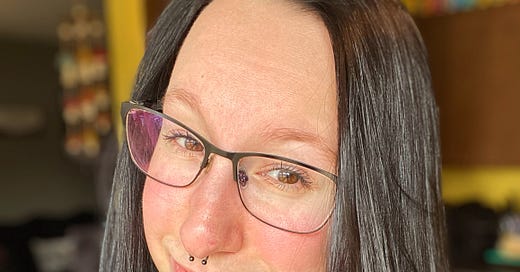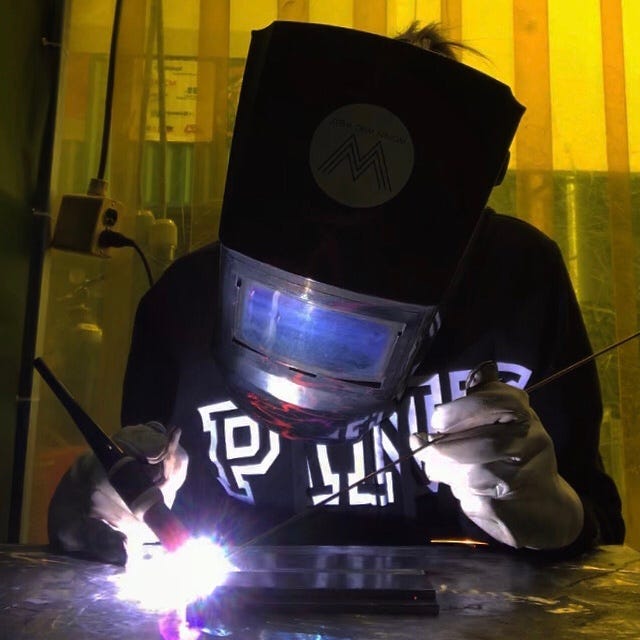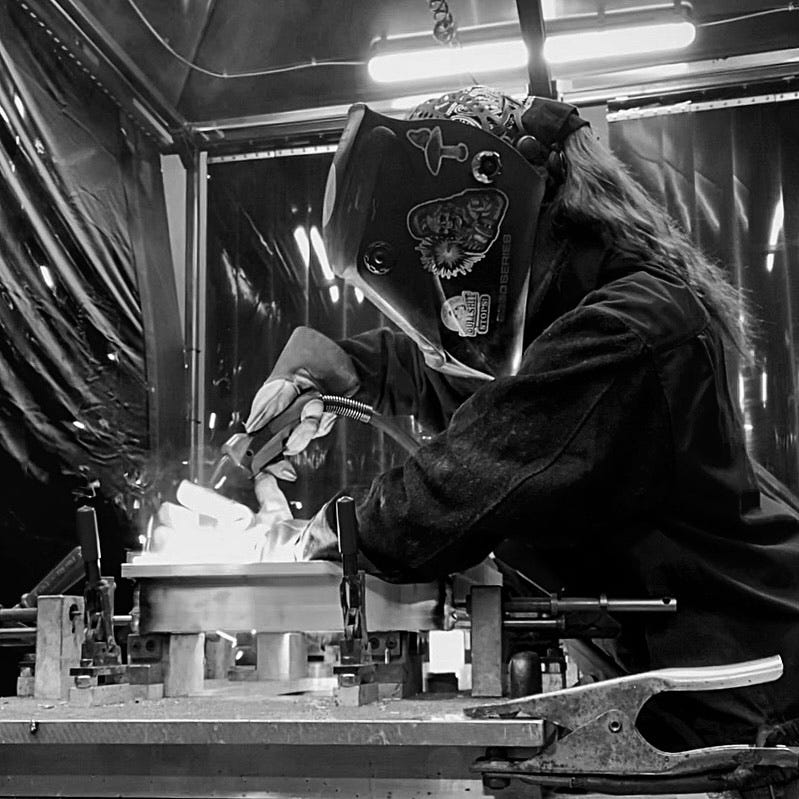Arclight is a long-form interview series in which Women Who Weld, a 501(c)(3) nonprofit organization that teaches women how to weld and find employment in the welding industry, showcases women who create, ideate, and collaborate across specializations and trades.
Janet Davis completed Women Who Weld’s Intensive Welding Training Program in November 2018 and also holds a certificate in welding from Lake Michigan College. She is a MIG Welder at Modineer in Niles, Michigan. Below is an edited and condensed interview between Samantha Farrugia, the founder of Women Who Weld, and Janet, a former Women Who Weld participant, in November 2024.
Where are you calling from?
My home in Buchanan, Michigan.
Where did you grow up?
I grew up in Bridgman. I lived there for 24 years.
Which is in Michigan, but you’re actually closer to Chicago than you are to Detroit?
Yeah, Chicago is only about an hour and a half away from here, and the state line to Indiana is about 20 to 30 minutes away.
Where did you work before becoming a welder?
I worked at Meijer, the retail store, for four years after I graduated from high school.
In 2018, you participated in both of Women Who Weld’s introductory and intensive welding training programs. Why did you pursue welding?
I got my associate's degree in graphic design after high school, but then I didn't like that path. I know some people who weld in my friend group, so I asked them about it and it sounded interesting. Then I saw your workshop and I was like, “You know what? I'll just give it a try.” And I really liked it.
What was it about the introductory workshop that inspired you to take our week-long intensive training class?
After the workshop, I thought I can probably do this more than just in my free time because I really enjoyed it, and I thought the week-long class would be a good opportunity; I felt like I could go in and I didn't have to know anything ahead of time. There was no intimidation, it was just a bunch of women who were like me and wanted to try it. It worked out really well, and I ended up going to college for more welding courses.

Why did you choose to attend Lake Michigan College’s welding program?
LMC was great. Everything they introduced me to there seemed really relevant. I was able to go off and do my own thing, but I still received a lot of instruction from my instructors. I was pursuing an associate’s there, but they also offered a certificate. And because I was there during Covid, I ended up just getting the certificate, but I still learned a lot.
How long was the program?
I did it in about a year and a half. It covered MIG welding, stick welding, basic metallurgy, some machine shop stuff. I wasn't able to keep going in-person because of Covid, but we were also just getting into robotics.
Why didn’t you pursue graphic design?
I took an internship that was required for my associate's degree in graphic design. I'm a very crafty and artistic person, and I like to do a lot of hands-on work just for fun. During the internship, I realized I don't like just sitting at a computer all day, and graphic design nowadays is all digital. I wanted to do something that was more hands-on and kept me moving rather than in a chair at a desk all day.
But even after you learned how to weld, you were accepted to a four-year college to study interior design. Why did you choose welding instead?
Oh, yeah, sometimes I forget that happened. I enjoy interior decorating and design, and I had signed up for the entire semester of courses at Western Michigan University and, last minute, after I had already met with an advisor and everything, I'm like, “You know what? I just want to weld.” I canceled all of my courses and signed up for courses at LMC, and it was one of the best decisions I’ve ever made. There's not a day that goes by that I regret going into welding.
Where have you worked as a welder?
I got a job at Modineer, which you connected me to, and I've been there for four years. It's changed a lot over the years and there have been ups and downs, but I really like it. I really enjoy the people I work with and the jobs we take on.
What are some of the projects you have worked on?
When I got hired I was primarily going to weld doors on the door line for AM General; they make military vehicles like Humvees. We don't do those anymore. We're now doing more of a variety but it's mainly a production welding shop, and we also have laser and form and everything down the line. We make parts for commercial vehicles and big trucks. Currently, I'm on a big job for John Deere.
What’s your schedule like, including start and end time, each day? Which days of the week do you work?
I work 4 a.m. to 2 p.m., four days a week.
What time do you wake up to get to work at 4 a.m.?
I wake up at 2:30 a.m. every day, and I go to bed at 6:30 p.m. so I can get my eight hours of sleep. It's a little strange.
Was it hard to get used to that schedule?
It was very difficult. When I first started, the schedule was 6 a.m. to 4 p.m. They changed the schedule because it was getting hot during the summer. We started earlier so it would be a little cooler since it gets so hot in the weld shop and we don’t have air conditioning. But then it became permanent because I guess it worked better with the entire shop as a whole.
Do you keep that schedule even on the days you don't work?
On the weekends I kind of just resort to whatever I feel like. I definitely do not get up at 2:30 in the morning.
Do you ever work weekends?
Yes, there have been times where we've worked five, six or seven days a week. Now we're doing the complete opposite and we're only working eight-hour shifts. So I'm only working 32 hours a week, depending on the workload, which rises and falls based on the demands of customers.
If you work over 40 hours do you get paid time and a half?
Yep, anything over 40 would be time and a half.
How long is your commute to work?
I live 10 minutes away. It’s completely dark in the morning, there’s barely any traffic on the road at all, so it’s kind of a nice drive.
Describe a typical day on the job?
Every day is very similar because we're doing the same jobs most of the time. I clock in at 4 a.m. and get assigned my job for the day. We have a computer system, so I log into the computer and prepare for my job. Then I get set up; I get my PPE and tools out, and then I start working. I am welding the entire time I am there aside from breaks and little things like if I have to stop to grind, or switch to a different job, or any little things that are technical for the job. At the end of the day, I clean up and log out and I'm out for the day.
Which process of welding do you primarily engage in?
Only MIG welding at my job.
What’s your favorite welding process, and why?
MIG welding is my favorite, probably because I have the most experience in it, but I enjoy being able to consistently weld. It’s simple, but I can still really improve on each weld I do. It's never the same, and it's not easy, like everyone says it is, especially if you want to put something down that is functional and nice looking. I also enjoy TIG welding, but I don't get to do that often.
What sort of tools and equipment do you use regularly?
My electric angle grinder, a little pneumatic grinder and a die grinder, and I often have to use my pry bar, hammer, tape measures, and whatnot. I get to use cranes too.
Are you a certified crane operator?
Yeah, we all had to go through a course at my shop to get certified. They're more like hoists that are in each of our weld booths, but we can operate other cranes that are in the plant too.
Which materials have you welded on?
Typically, mild steel, but we also have aluminum jobs. And in the past, we have done stainless steel MIG, which was interesting.
At my shop we primarily use pulse so it's a little different than most places that use, like, short-circuit; pulse feels more like spray, but when you're welding aluminum with pulse, it's more obvious and a little more irritating. I don't mind it while I'm welding steel, but on aluminum it's so much brighter and so much louder. It sounds like it's going to burn back all the time.
For those who may not know, there are four ways to transfer metal when MIG welding: short-circuit, spray, pulse spray, and globular. ‘Metal transfer’ refers to how small droplets of metal literally transfer across an electric arc. Pulse spray occurs when the power source rapidly switches from a high current to a low current: molten droplets form during the high current and the arc is maintained during the low current, allowing for the droplets to transfer steadily as the current pulses.
How many other welders do you work with?
On my shift, I believe there are 20 of us, and I'm the only woman on first shift, and I don't think there are any on second shift either. We’ve had a couple of other females, but they never stuck around.
Have you experienced any challenges as the only female welder on staff?
Honestly, no. At first, I was nervous about it, but the only challenge I really face is lifting heavier jobs, but I have several co-workers who will either tell me I can't lift it on my own or they'll just instinctively come help me, but I feel comfortable enough asking for help if I ever need it.
Also, on the job itself and actually welding, it’s just me challenging myself to be able to do certain jobs, but I enjoy doing that, so it's not necessarily a challenge.
Has your pay increased now that you are a welder?
Oh, for sure. Within three months of getting this job as a welder, I moved out of my parents' house and on my own. It was a significant increase in pay and it helped me move forward in life a little bit.
And over the past four years, my pay has increased by about $10 per hour. I get paid pretty decently from what I’ve heard from other welders. I think it’s gotten better because of my education and based on how I actually perform on the job.
How old are you?
I’m 28.
You were only 21 when you took our training programs! What are your future career goals?
I know I want to keep welding for as long as I can. But if I ever were to stop welding it would be because of health risks. And if so, I'd still like to do something within the welding industry. I still enjoy welding a lot but I know there will come a day, maybe when I'm 40, where I'm like, “You know what? I can't take this anymore.”
Robotic technology is changing and advancing rapidly. For example, welding cobots (collaborative robots) are a newer robotic technology in which the welder configures the cobot and they weld ‘together’ in an automated way. I’ve interacted with one produced by FANUC and, unlike traditional welding robots, their cobot is easy to program as it operates off sensors and makes for a more intuitive process. So, as a robotic welder, you could step away from the hazards of the job: bright lights, noise, fumes, repetitive movements, while stepping in and welding as needed.
That’s good to know because we actually have a lot of FANUC robots at my shop.
At one point you were interested in joining a union, are you still?
No, I’ve been offered to join a union a couple of times, and I hear the benefits are incredible. But, a lot of unions work like seven days a week, 12-hour days, and I'm not sure I could do that physically.
What do you like most about being a welder?
I enjoy welding consistently, and I also really enjoy being left alone for most of the day. I have my own routine, I don't have to be hovered over, and it's a more relaxed work environment. I can work with other people, and I can work as a team when I need to, but for the most part, it's just me doing my own thing; I work, listen to music all day, and stay in my own little bubble, and that's just how I personally like to work.
At the same time, there is still a lot of social interaction. I'm one of the people that gets to train other welders a lot, and I also enjoy being able to do that. It's a good balance.
“There's not a day that goes by that I regret going into welding.”
Do you have advice for women who may be interested in pursuing a path in welding?
Accept challenges and don't be afraid to learn new things. If an opportunity presents itself, and you can learn something you're maybe not 100% comfortable with, but you are open to the idea of it, just step up and do it, and don't let anyone intimidate you out of trying to face challenges. And if you need help, always ask for help.
What do you like to do in your free time?
I do a lot of hiking. I hunt. I fish. I do a lot of photography, and I spend a lot of time with my family and my pets.
If you were not a welder, which career path may you have chosen?
If I wasn't a welder, I'd probably be doing something with the DNR, because I really like the outdoors and one of my childhood dreams was to work at a fish hatchery. And sometimes I still think about that, so maybe that's something I would do down the road.
If you could travel anywhere, where would you go and why?
Hmm, I gotta think about that one…if I could travel anywhere I would go to Japan, because the culture there has always fascinated me. And they have some really incredible forests, too. It's very different from here, but I've always wanted to go there. It’s very expensive to go, and I would need a lot of time, but I think it'd be really neat and pretty to go see!







My daughter is a welder for over 7 years